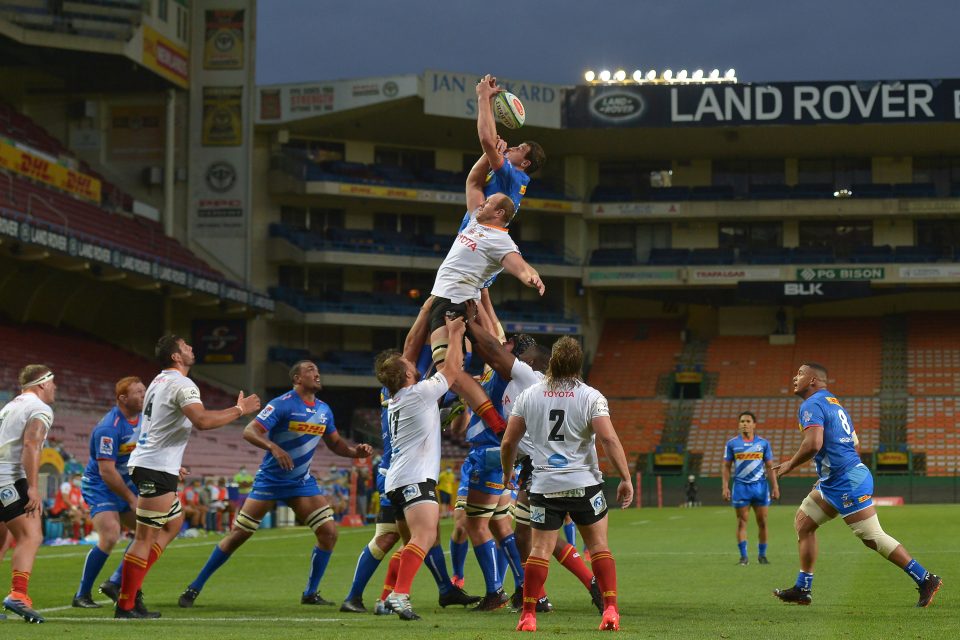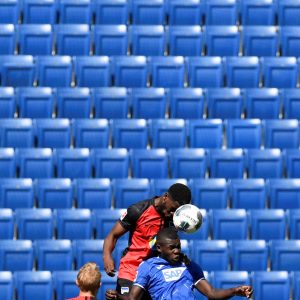SA Rugby’s Covid-19 dilemma
Rugby hasn’t escaped the pandemic and the problems it has brought upon life and every organised activity that people enjoy.
Author:
16 November 2020

Of all sporting codes, only a few test the notion of social distancing like rugby.
Anyone who has ever clapped eyes on the eight-man machine that is the scrum being assembled will have seen the hooker squeezed like an unopened tube of toothpaste between two props; noted said props loosen the front of their jerseys so the locks behind them can put their one loose arm between their legs, to get a hold of the jersey to bind; and will have spotted the eighthman recoil from the ball sweat pong before sticking his head between the two locks’ backsides.
That’s not even taking into account the rolling mauls, being trapped under the multiple-car pile-ups that are rucks and the blood that tends to flow freely whenever a game of rugby breaks out. Given that level of intimacy, rugby should be a hotbed for the transmission of Covid-19.
Indeed, with the recent cancellations of the Lions’ Super Rugby game against the Cheetahs (due to an outbreak at Ellis Park), and England’s match against the Barbarians (after the latter breached Covid-19 protocols), it’s easy to conclude all that crouching, binding and setting is the easiest way to get the coronavirus.
But leading SA sports scientist Ross Tucker, who has worked extensively with World Rugby’s Medical Commission on the game’s response to the global pandemic, said the science doesn’t support that kind of two-plus-two-equals-four thinking.
“There hasn’t been a single case linked to playing rugby so far that I’m aware of,” he begins. “It might be different in a community game but in a professional game where there have been positive cases I don’t know if anyone has linked those to actual on-field transmission.
“It’s coming from the social stuff, you know, like the after-match activity. It’s very interesting, the risk of transmission playing sport is deemed to be extremely low, even in rugby. There are a couple of reasons for that, one is the exposure time is quite short even though it’s close.
“Front rows packing down in the scrums are only exposed for a few minutes over the course of 12 scrums but only for 20-30 seconds at a time – so it’s very short exposure, even though it’s close exposure.
Related article:
“I think the main reason is if you’re running onto a rugby field you’re not symptomatic, even if you’ve got it, and asymptomatic transmission is much less likely as far as I understand. There aren’t many rugby players who are going to line up in a rugby match with a fever, a cough, a headache and all the Covid-induced symptoms – they’ll be withdrawn because they just can’t play.”
Clint Readhead, SA Rugby’s Medical Manager, reckons that, if anything, the training environment has emerged as a safe space for players, what with the incessant testing for Covid-19. “Training’s actually quite a protective and healthy environment as long as you keep your social bubble small and you look after yourself,” he said.
Victory of the healthiest
For all that, Covid remains as real a threat for rugby as it does in any other sphere.
There was no positive test in the Barbarians’ team but their going out on the lash reportedly cost their hosts, the Rugby Football Union, about £1 million in rebates to Sky Sports for a game that never took place. Also, the Lions and Cheetahs had to share points after their cancellation, which, in a truncated competition, means they’re unlikely to make up the lost ground.
Bulls chief executive Edgar Rathbone – who welcomed a new arrival in young Edgar William during lockdown – admits that the possibility of a match being cancelled is another reason that keeps him up at night.
“It’s a helluva concern, I said it to [Bulls director of rugby] Jake [White] the other day as well. It’s nice that we’ve given the players the freedom of being with their families, but we need to keep on pressing that it’s a privilege at this stage.
“If pressure comes and we have an outbreak then we might have to look at putting all our players in a hotel and isolating them because the reality is the team that’s going to win this competition is going to be the healthiest team.
“By all means they have to perform on the field, but just like that you could share points on a game you need to win.”
The bubble conundrum
During the planning stages of its return-to-play strategy, SA Rugby had considered putting all the teams in a bio bubble – like the Premier Soccer League and the National Basketball Association had done – but the idea was prohibitive on two fronts.
“It was just too expensive, to be honest,” explains Rathbone. “That for me is the worst-case scenario to go into a hotel. You can imagine the cost of staying in a hotel, with the food and everything, is way more than testing once a week.
“I think the quote we got per person sharing a room including your meals was R1 100 per night (for 45 to 50 people). If you had to do that for the whole tournament, which is 12 weeks, the calculations become quite ugly. Plus you need to keep on testing anyway, so it’s a double whammy.”
Related article:
While Tucker understands the point of a bio bubble, he worries about the stir-crazy effects of the players basically being locked away in their workplace.
“It’s necessary to protect the sport from the community in which it exists.
“The reason a bio bubble works is because it protects the players when they’re not playing as they can’t go and socialise. The bio bubble ensures that the players can’t get Covid in the 166 hours a week that they’re not playing a match.
“We had a Zoom conference with World Rugby’s Medical Commission and we had a guy talk about his experiences inside the bubble in North America. Psychologically, it’s very difficult for those people in that bubble because they’re locked off from their lives and for six or twelve weeks they’re effectively held captive by their sport,” said Tucker.
It’s rugby, but not as we know it
Like most sports that have returned to play post-Covid-19, rugby hasn’t been exempt from the spectre of empty stadiums and altered business models. “For us it was quite important to get back on the field even though we have empty stadiums because then at least you can give value to your sponsors.
“At the end of the day they’re buying TV time, so the impact of no supporters in the stadium is not as big on the sponsorships. In fact, I think the viewership on TV has been higher than it would normally be.
“But then it’s been tough on our main stakeholders, like season ticket holders and suite owners, because you’ve basically sold them something you can’t give them value for.”
The domestic season only beginning in October – the last month of the campaign – has wreaked its own havoc, especially on the contracting side. Ordinarily, rugby’s “transfer window” is at the end of October, but the outbreak of Covid-19 introduced a second one in May.
SA Rugby’s response to shutting the game down was to introduce blanket pay cuts in May, but they gave the players a three-week grace period to terminate their contracts if they felt they could get work elsewhere for the same pay or more, which at the time caused a frenzy of players desperate to bail out of their diminished contracts.
But the usual 31 October deadline didn’t exactly go away, so we’ve had a situation where players have played for one team for two or three games and then moved to the opposition in November to complete the season.
Related article:
One of the biggest domino effects of Covid-19 was the Springboks being withdrawn from defending the Rugby Championship because not only were they palpably not ready (having begun playing too late), they also emerged from lockdown a little soft around the edges.
The upshot of that is the world champions probably won’t have played a match for 18 months since they won the World Cup.
The people whose lives have been turned upside down by the whole thing are the players and the team doctors. The latter suddenly find themselves the most important part of team management because they also serve as Covid-19 experts and compliance officers.
Cheetahs stand-in captain Junior Pokomela said the last few months have been surreal.
“Not having fans for the duration of the tournament has been a huge change. You realise how important fans are because now if you play away it’s like you’re playing at home, and if you’re playing at home it’s like you’re playing away because any team can win.
Related article:
“The ‘new normal’ has been quite depressing, from having to fill in Covid questionnaires, taking your temperature at the gate, having Covid tests every Tuesday (at R590 per person), training with a mask on, initially not being able to touch the ball…
“As rugby players we like to have a beer after the game, now we can’t do it, you can’t even shower at the stadium anymore. When I went to the Springbok (Green and Gold) showdown we all had single rooms, which is unusual for a player because you normally have a roommate.
“It’s been tough, but we’ve had to adjust,” said Pokomela.




